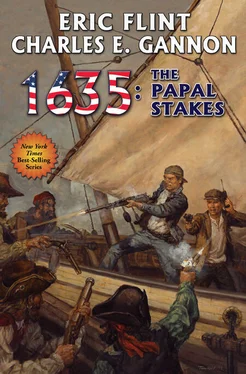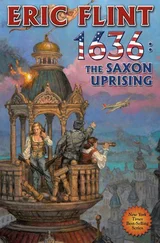Eric Flint - 1635 - The Papal Stakes
Здесь есть возможность читать онлайн «Eric Flint - 1635 - The Papal Stakes» весь текст электронной книги совершенно бесплатно (целиком полную версию без сокращений). В некоторых случаях можно слушать аудио, скачать через торрент в формате fb2 и присутствует краткое содержание. Жанр: Исторические приключения, на английском языке. Описание произведения, (предисловие) а так же отзывы посетителей доступны на портале библиотеки ЛибКат.
- Название:1635: The Papal Stakes
- Автор:
- Жанр:
- Год:неизвестен
- ISBN:нет данных
- Рейтинг книги:3 / 5. Голосов: 1
-
Избранное:Добавить в избранное
- Отзывы:
-
Ваша оценка:
- 60
- 1
- 2
- 3
- 4
- 5
1635: The Papal Stakes: краткое содержание, описание и аннотация
Предлагаем к чтению аннотацию, описание, краткое содержание или предисловие (зависит от того, что написал сам автор книги «1635: The Papal Stakes»). Если вы не нашли необходимую информацию о книге — напишите в комментариях, мы постараемся отыскать её.
1635: The Papal Stakes — читать онлайн бесплатно полную книгу (весь текст) целиком
Ниже представлен текст книги, разбитый по страницам. Система сохранения места последней прочитанной страницы, позволяет с удобством читать онлайн бесплатно книгу «1635: The Papal Stakes», без необходимости каждый раз заново искать на чём Вы остановились. Поставьте закладку, и сможете в любой момент перейти на страницу, на которой закончили чтение.
Интервал:
Закладка:
“That will occur anyhow, as your ability to balloon directly into Italy becomes more clear to the Spanish.”
“It is true that they may become annoyed by that, but not so much to mount an attack on you.”
“Why not?” Ziegler threw his considerable bulk forward aggressively. “Are you suggesting they will sit idly by while this new trade route opens up?”
“Yes, that is exactly what I am suggesting.”
Clearly, this was not the answer Ziegler was expecting; his bulk fell back in surprise. “Why?”
“Because the Spanish-of all the powers of Europe-have shown the least understanding of, or interest in, the new economy that air travel will enable. Their banking methods are hopelessly archaic and filled with exclusions and restrictions that ensure that their nation’s power remains firmly in the hands of the hidalgos, the upper classes. They do not know how to grow wealth-and therefore, will not even understand the value of this new route of exchange. Not until it is too late.”
That brought a grimly satisfied smile even to Ziegler’s face. But this time, it was Jenatsch who held to the prior point like a bulldog: “However, this still means that there will be no direct military alliance between you and us. And, for us, that means no offensive to liberate the communes that are still in Austrian or Spanish hands. So we might be a bit safer, and a bit more wealthy, but still crushed by foreign occupiers in many of our regions.”
Miro smiled. “But for how long?”
Jenatsch looked suspicious. “What do you mean? Do you propose that Heaven will deliver us? God alone knows how often and ardently I have prayed for divine deliverance-”
— Miro reflected that Jenatsch might even be telling the truth “-but no angels have come to drive out the invaders. So what mysterious power are you suggesting will deliver us?”
“Not a mysterious power: just simple geography. The geography of realpolitik.”
Jenatsch blinked at the unfamiliar term, even though it was in his native German. “What do you mean?”
Miro pointed to the map on the table, located at their equidistant center. “What do the Hapsburgs call the Valtelline?”
Jenatsch frowned; he clearly did not appreciate any discursive approach that left him feeling as though he was being schooled. “It is the transalpine part of what they dub the Spanish Road. As you well know. From Chiavenna to Tyrol, it is how the thrice-damned Spanish and Austrian Hapsburgs exchange troops and goods. It is also a barrier against similar north-south exchanges for the rest of Europe.”
“And which Hapsburg activities has it enabled in the last ten years?”
Jenatsch considered. “The wars in Germany: what the up-timers call the Thirty Years’ War. Also, the Spanish campaigns against the Dutch.”
“But what has happened to those activities?”
The smile returned to Jenatsch’s face; Miro could well imagine that savage expression glaring at him over the glinting edge of an axe.
Miro explicated the obvious for Ziegler’s benefit. “Spain’s adventurism north of the Alps has all but vanished. In the Low Countries, the infante Fernando increasingly turns his back on Madrid; his brother the king seems no more eager to send new troops to him than the new ‘King in the Low Countries’ seems to have them. Besides, any further influx of Spanish troops would make his partner in the Provinces, Frederik Hendrik of Orange, exceedingly nervous. Possibly warlike.
“And with that old papist firebrand Ferdinand of Austria dead,” Jenatsch said with satisfaction, “his namesake son and successor is pursuing a more moderate course of action.”
“Much more moderate. Particularly since his sister married Fernando, who rescued her from a war zone with the assistance of an up-time aircraft. Indeed, after the recent war with Bavaria, one could almost call the relations between the USE and Austria cordial. They are at the very least quiescent. And if Wallenstein can be induced not to encroach southward across the Austrian border from Bohemia, I very much suspect that the worst of the middle European wars are behind us-with the greatest loser being Spain.”
Ziegler looked baffled. “Spain? What do you mean? Other than losing a few tercios, how has Spain suffered so greatly?”
Jenatsch’s predatory grin was back. “Our visitor is talking about losses in influence, not men or money, Herr Ziegler. This new Austrian king has allowed his relations with Madrid to cool, has tacitly approved Fernando’s claim in the Low Countries by allowing his sister to marry him without challenging the legitimacy of the title and land he claims. And this is why Spanish movement through the Valtelline has diminished so greatly in these past two years.”
Miro nodded. “You see the rest, of course.”
The blank look on Ziegler’s face was the antithesis of the cunning insight on Jenatsch’s. “Of course. Spain holds its Road in the Valtelline, but feels less need for it. Its value as a conduit is lost; its value as a defensive blockade, interposed between the north and south extents of Europe, diminishes also. With its treasury ever-more overdrawn, Philip of Spain-or rather, Philip’s puppet-master and lap-dog, Olivares-will withdraw most of the investment required to retain the Valtelline. And when their alliance with the French finally unravels, as it must-”
“-you will be able to stand aside, and let the weak French and Spanish alpine forces exhaust themselves upon each other.”
“At which point, the USE will intervene and help us take back all our lands!” Jenatsch’s smile was shadowed; he wasn’t in jest, but he knew he had gone too far, intentionally so. He was testing Miro.
Miro smiled. “That last projection is beyond current consideration, Colonel. But the rest of what you envision seems very likely to transpire within the next several years. All you need to do is save your treasure and energy, and await the inevitable. The USE presence in Chur will disincline any trifling adventurism by Spain or France. And you, I’m sure, will give them no reason to do so. In the meantime, we will increase regular overland trade to Chur as well.”
Now Ziegler sat up straight again; the discussion had moved back into familiar territory, for him. “How so?”
“I am even now negotiating to establish a proprietary trade link over the Bodensee between Buchhorn and Rorschach.”
“And why is this trade route useful to you?” Ziegler’s brows were beetled in intense suspicion. “It has been of only marginal interest to the Germans, up until now.”
“In addition to various resources and goods common in the Alps but somewhat scarce in Germany, we can provide Graubunden with finished goods from northern Europe without adding on the tariff costs incurred when they pass through Constance or Zurich first. But also, we must have a way of ensuring that there is always enough fuel on hand here in Chur, and a regular schedule of overland portage is the most prudent way to do so.”
Ziegler actually rubbed his hands together. Jenatsch at last leaned back, his eyes almost blank, his imagination no doubt racing inward along spider webs of new, interlocking schemes and stratagems. “So Herr Miro,” Ziegler exhaled, “which of our alpine goods most interest your-?”
There were two slow knocks on the door, followed by three, staccato raps.
Miro held up an apologetic hand. “With your pardon-” Over his shoulder, he said, “Enter.”
Virgilio Franchetti, Miro’s senior blimp pilot and builder, stuck his head in the door. “Don Estuban, you asked to be informed when the fuel test was complete.”
This was a complete and utter fabrication; the fuel mixture had already been tested and set. This phrase was, instead, a prearranged code to inform Miro that new priority orders had been received over the radio, orders that required immediate action.
Читать дальшеИнтервал:
Закладка:
Похожие книги на «1635: The Papal Stakes»
Представляем Вашему вниманию похожие книги на «1635: The Papal Stakes» списком для выбора. Мы отобрали схожую по названию и смыслу литературу в надежде предоставить читателям больше вариантов отыскать новые, интересные, ещё непрочитанные произведения.
Обсуждение, отзывы о книге «1635: The Papal Stakes» и просто собственные мнения читателей. Оставьте ваши комментарии, напишите, что Вы думаете о произведении, его смысле или главных героях. Укажите что конкретно понравилось, а что нет, и почему Вы так считаете.











